Crucial Iran nuclear talks open in Geneva
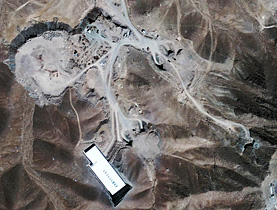
Talks between the group of six world powers and Iran over Tehran's nuclear programme are being held in Geneva, amid mounting tension.
Bruno Pellaud, former deputy director of the International Atomic Energy Agency (IAEA), tells swissinfo.ch that there is a lack of unity among the negotiating partners. He also predicts that Iran may face tougher sanctions.
The talks follow the discovery of a second uranium enrichment site in Iran.
Pellaud was a top IAEA official from 1993 to 1999, dealing extensively with North-Korean and Iranian issues. From 2001 to 2009, he was president of the Swiss Nuclear Forum.
He has maintained a key interest in nuclear energy and non-proliferation and presently writes on nuclear issues for the influential American website Huffington Post.
swissinfo.ch: Iran has been in crisis since the disputed re-election of President Mahmoud Ahmadinejad. Is this an opportunity or handicap for the Geneva talks?
Bruno Pellaud: It is very difficult to say whether Iran is in a weak or strong position. There is wide consensus among all Iranian factions over the nuclear issue.
In any case, the Iranians will maintain their tough line and will reject efforts to stop the enrichment of uranium in Iran, as they have repeatedly stated.
swissinfo.ch: Iran recently ratcheted up tensions with long-range missiles tests and its newly-revealed nuclear facility. Is this just a negotiating tactic?
B.P.: Whether it’s the missile tests or Ahmadinejad’s provocative speeches, the Iranians are upping the ante to show they are in charge back home and can represent a military threat to their neighbours.
But the discovery of a second uranium enrichment site is not the result of a spontaneous Iranian public declaration. Apparently the Russians warned Tehran that western secret services were ready to reveal the existence of this site. Iran therefore took the initiative by announcing its existence to show they respect legal mechanisms.
swissinfo.ch: Have these recent developments consolidated the six powers’ negotiating position with Iran?
B.P.: To want to prevent Iran from possessing a nuclear weapon is a very serious objective. But the way in which the negotiations are taking place is very unwise.
You have five countries with nuclear weapons, and Germany, which doesn’t. What’s more, two of the participants – China and Russia – have no intention of applying serious sanctions against Iran.
My feeling is that Russia is participating in these negotiations to prevent an agreement between Iran and the West given the stakes surrounding Iranian gas, which would allow Europe to become less dependent on Russian gas.
And the EU is profoundly divided over Iran, with countries like Italy, which has very close trade ties with Iran and doesn’t want sanctions, and nations like France, which back tougher sanctions.
This kind of uncoordinated front will not impress the Iranians.
swissinfo.ch: Barack Obama’s outstretched hand approach to Iran seems to have changed…
B.P.: The American president has recently adopted a very tough line, alongside the French president and the British prime minister. This is designed to show that Iran will have its back to the wall in Geneva.
But Barack Obama promised talks without any preconditions, which the Iranians interpreted as not asking for the immediate halt to their uranium enrichment programme.
The main issue at this meeting is whether it will be followed by another one. If such a get-together is planned on Thursday, it will be a success.
swissinfo.ch: What is the main issue at stake in this tussle with Iran – to combat nuclear proliferation or to curb Iran’s role as a regional power?
B.P.: Probably both, although nuclear proliferation is in the spotlight right now.
Iran has acquired the necessary technologies for a military nuclear programme. It will soon secure the virtual ability to build a nuclear weapon. It’s therefore all about stopping it.
It remains to be seen how this is done. The hardliners want to break Iran’s back so that it cannot reach this objective. The others believe that to stop Iran from becoming a nuclear power you have to negotiate, while accepting certain compromises and controlling most of its nuclear facilities to prevent their military use.
This second option would enable Iran to save face allowing it to develop limited non-military nuclear capacities.
In the short term the nuclear question is the main issue. Barack Obama has already said he would accept Iran becoming a major regional power if it gave up the idea of possessing a nuclear weapon.
swissinfo.ch: And what about the chance of a military strike on Iranian nuclear facilities?
B.P.: This is the Sword of Damocles dangling over their heads. Certain US Republicans, as well as Israel, are convinced that a simple, radical solution would be to bomb Iran’s nuclear facilities.
This would be absurd as the Iranians have openly spread their facilities across the country. In fact, it is be impossible to destroy Iran’s nuclear potential. US Defence Secretary Robert Gates recently declared that a bombing campaign would only delay Iran’s programme by a few years.
What’s more, a military attack would push Iran towards a military nuclear programme.
Unless there is an opening up of the situation and a more rational basis for negotiations, we are heading for tougher sanctions. But on this point, the negotiating nations are not at all united.
Frédéric Burnand in Geneva, swissinfo.ch (Adapted from French by Simon Bradley)
The European Union and Iran officially asked Switzerland to hold talks between Iran and six world powers in Geneva on October 1, 2009.
The last meeting of this kind was held in Geneva on July 19, 2008, also organised by Switzerland.
The chief negotiator for the EU, Javier Solana, is leading the talks. He is accompanied by top diplomats from China, Russia, the United States, France, Britain and Germany.
They will meet with the Iranian negotiator, Saïd Jalili, at an unknown location close to Geneva.
The six world powers want to obtain guarantees concerning Iran’s nuclear programme, which is suspected of having military objectives. Tehran denies this.
The question has become critical after the news last Friday of a second uranium enrichment site hidden under a mountain near Qom in the centre of Iran, which Tehran only revealed to the International Atomic Energy Agency (IAEA) on September 21.
On September 28 Iran test-fired long-range missiles capable of hitting targets across the Middle East and beyond.

In compliance with the JTI standards
More: SWI swissinfo.ch certified by the Journalism Trust Initiative


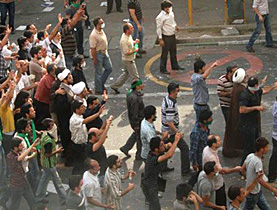
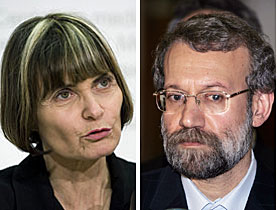
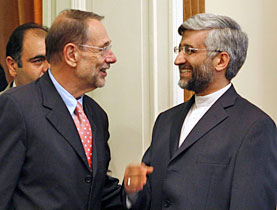
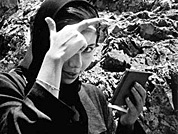
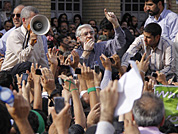
You can find an overview of ongoing debates with our journalists here. Please join us!
If you want to start a conversation about a topic raised in this article or want to report factual errors, email us at english@swissinfo.ch.